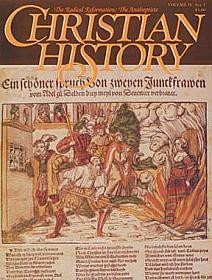Anabaptists from the Augsburg Meeting Paid with Their Lives
ON THIS DAY, 20 August 1527, sixty Anabaptists leaders assembled in Augsburg. That meeting is known as the “Martyr Synod” because most of those in attendance would die as martyrs within five years.
Among the notable Anabaptists present were Hans Denck, Ludwig Hätzer, Konrad Huber, Hans Schlaffer, Leonhard Schiemer, Balthasar Hubmaier, and Hans Hut. These men had found that common folk responded eagerly to their message of godliness, Christ-centered living, and independence from the state church. They had also found that wherever they achieved a following, Lutheran and Catholic authorities such as Luther, Osiander, and various bishops unleashed persecution on them. Basel had even passed a law making it illegal to give aid to any Anabaptists. (To his credit, the reformer Oecolampadius flouted this law to assist Hans Denck when he was dying. Denck had been viciously slandered by mainstream reformers when he demanded that they live lives in keeping with their claims of faith.)
In fairness to the establishment, the Peasant Revolt had taken place not many years before and European powers were fearful of popular religious and political movements. Also, several Anabaptists held unusual views. Hut preached that peasants should overcome their masters and prophesied the end of the world within his lifetime. Denck seems to have placed each person’s inner light above Scripture. At least according to his enemies, Hätzer committed adultery. All this gave the authorities excuse to harass Anabaptists.
Anabaptists believed the church should consist only of converted believers and baptism should be restricted to those old enough to make a profession of faith. Each church should have the right to appoint its own pastors. Church and state should be separate. Many thought it was wrong to take oaths or to serve in government or the military. Others thought Romans 13 allowed a believer to do all three. The Martyr Synod attempted to settle such differences. More importantly, it divided the German-speaking areas of Europe between pairs of missionaries so that they could spread their teaching as rapidly as possible without duplication of effort.
Many principles for which Anabaptists died, such as separation of church and state, are accepted tenets by Christian groups today. Anabaptist teachings were carried forward by groups such as the Amish, Baptists, Mennonites, Hutterites, and Quakers.
—Dan Graves
----- ----- -----
The Radicals tells the true story of Hans and Margaretha Sattler, two of the early Anabaptists who suffered martyrdom. Watch it at RedeemTV.
The Radicals can be purchased at Vision Video.
For more on the Anabaptists and their confession, see Christian History #5 Radical Reformation: The Anabaptists
Never miss an issue of Christian History. Subscribe today.








